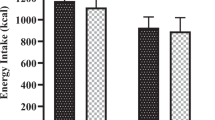Abstract
Objective: The present study investigated the effects of consuming preloads with different macronutrient and energy contents on subsequent intake and subjective feelings of hunger and satiety in children, young adults and the elderly.
Subjects: 30 Children (4–6 y), 33 young adults (18–26 y) and 24 elderly (61–86 y).
Design: A ‘preload test meal’ design was applied. Subjects were given four different strawberry yoghurt preloads that varied in energy and macronutrient content, or no yoghurt. Children, young adults and elderly consumed 200, 340 and 300 g of the preload, respectively. One yoghurt was low-fat, low-carbohydrate and low in energy (the control; 0.7 MJ/500 g serving), one yoghurt was high-fat and medium in energy (71% of energy (en%) of fat; 2 MJ/500 g serving), one yoghurt was high-carbohydrate and medium in energy (87 en% of carbohydrate; 2 MJ/500 g serving) and the fourth yoghurt was high-fat and high-carbohydrate and high in energy (42 en% of fat and 53 en% of carbohydrate; 3 MJ/500 g serving). Ninety minutes after preload consumption, subjects had an attractive ad libitum lunch-buffet. Energy intake at lunch and subjective feelings of hunger and satiety were analysed.
Results: The ability to compensate at lunch did not differ among the three age groups. Compared to the no-preload condition, all children, young adults and elderly ate significantly less after the high-fat and high-carbohydrate yoghurt. The energy compensation observed in the children ranged between −21% and 34%, in the young adults between 15% and 44% and in the elderly between 17% and 23%. Hunger responses were clearly different between young adults and the elderly. Compared to the no-preload condition, the young adults showed larger differences in their appetite ratings than the elderly, indicating that the elderly were less sensitive to the energy content of the preload than the young adults.
Conclusion: We conclude that the ability to regulate the food intake within a preload 90 min test meal paradigm did not differ among children, young adults and the elderly.
Sponsorship: This study was funded by the European Commission as part of project FAIR-CT95-0574.
European Journal of Clinical Nutrition (2000) 54, 239–246
This is a preview of subscription content, access via your institution
Access options
Subscribe to this journal
Receive 12 print issues and online access
$259.00 per year
only $21.58 per issue
Buy this article
- Purchase on Springer Link
- Instant access to full article PDF
Prices may be subject to local taxes which are calculated during checkout
Similar content being viewed by others
Author information
Authors and Affiliations
Contributions
Guarantor: EH Zandstra
Contributors: EH Zandstra, M-FAM Mathey, C de Graaf, WA van Staveren
Corresponding author
Rights and permissions
About this article
Cite this article
Zandstra, E., Mathey, MF., de Graaf, C. et al. Short-term regulation of food intake in children, young adults and the elderly. Eur J Clin Nutr 54, 239–246 (2000). https://doi.org/10.1038/sj.ejcn.1600927
Received:
Revised:
Accepted:
Published:
Issue Date:
DOI: https://doi.org/10.1038/sj.ejcn.1600927
Keywords
This article is cited by
-
Interindividual variability in appetitive sensations and relationships between appetitive sensations and energy intake
International Journal of Obesity (2023)
-
Gender differences in the association between stop-signal reaction times, body mass indices and/or spontaneous food intake in pre-school children: an early model of compromised inhibitory control and obesity
International Journal of Obesity (2015)
-
Preliminary evidence for an impulsivity-based thrifty eating phenotype
Pediatric Research (2012)
-
Effect of a nutrient-enriched drink on dietary intake and nutritional status in institutionalised elderly
European Journal of Clinical Nutrition (2009)
-
Change in taste preference in undernourished elderly hospitalized subjects during periods of infection and convalescence
The Journal of nutrition, health and aging (2009)



